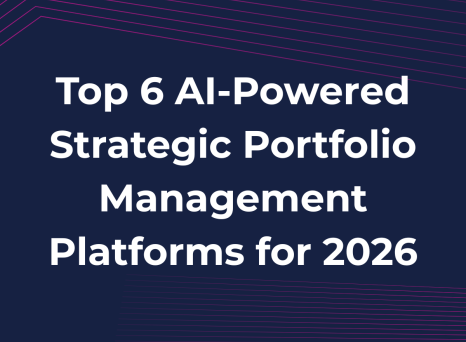Today, our highly connected world and globalized economy provide us with incredible opportunities. But this same interconnectedness causes unprecedented events to have domino effects that stretch across the globe.
Today, our highly connected world and globalized economy provide us with incredible opportunities. But this same interconnectedness causes unprecedented events to have domino effects that stretch across the globe. COVID-19 and the subsequent supply chain crisis; Russia’s invasion of Ukraine and the following spikes in oil and gas prices; Brexit and its impact on international trade agreements. Turbulence is no longer isolated. Instead, it has led to economic instability for businesses and consumers everywhere. As a result, there is increasing pressure on businesses to boost return on investment (ROI).
Project Management Offices (PMOs), in particular, have been feeling this pressure, especially since ROI isn’t the only metric they need to consider in 2024.
Today, sustainability is also a measurable indicator of business success. This is not just because 72% of people worldwide support climate policies and over 70% of Americans agree that humans are causing climate change. But also because environmental, social, and governance (ESG) regulations are evolving, with upcoming CSRD and ESRS regulations and changes to ESG rater requirements.
For busy PMOs, sustainability may not seem like a priority. But you don’t have to choose between sustainable project management and ROI. In fact, sustainability can help drive your ROI and work to your advantage to meet your strategic goals. This article will explore the benefits of implementing Projects Integrating Sustainable Methods (PRiSM) principles to deliver sustainable project management and strong ROI.
An Introduction to PRiSM Principles
Let’s start by exploring PRiSM, a method built on 6 principles that ensure sustainability is a critical focus in project management (PM). Green Project Management (GPM) Global developed the method back in 2013. While the importance of sustainability to businesses has reached remarkable heights since then, the principles of PRiSM remain integral to sustainable PM. The 6 principles are as follows:
- Commitment and accountability. Acknowledge the right to a safe, healthy, clean working environment. Commit to fair pay, ethical sourcing, and adherence to the law.
- Ethics and Decision-Making. Make decisions that consider long-term impacts and aim to prevent negative outcomes.
- Integrated and Transparent Decision Frameworks. Align how you track, manage, and practice social integrity, environmental impact, and economic development.
- Principle of Value. Optimize technology and resource usage to help reduce the consumption of natural resources.
- Social and Ecological Equity. Examine human vulnerability based on demographics in environmentally sensitive areas and densely populated cities or towns.
- Economic Prosperity. Create fiscal targets to meet the needs of present and future stakeholders.
These principles provide a valuable framework for supporting your ESG. You can read the principles in full here.
How PRiSM Principles Benefit PMOs and Drive ROI
By weaving PRiSM principles into your business, you can deliver more sustainable project management without compromising ROI. Let’s explore how.
- Future-proof your business. By following the PRiSM principles, you play a vital role in your business's long-term success while having a positive impact on people and the planet. Become more attractive to future investors, employees, and consumers. Optimize technology to embrace continuous digital transformation. And ensure continuous compliance with ESG regulations with transparent data.
- Position the PMO as a strategic advisor. The PMO is a crucial business function— your responsibility is to lead the way in positive change. By aligning environmental impact with economic development and using data to improve decision-making, for example, PMOs can improve processes, meet ESG demands, and cut costs for the business. In turn, the PMO becomes a trusted advisor to the C-suite.
- Strengthen your project risk assessment. Building supply chain resilience is a necessity for PMOs. Everyday project risks, like scope creep, conflicts, and stakeholder approval, are common. With the right tools and processes, you can avoid them. ESG risks, however, can have detrimental effects on your projects, too. And often, they arise with little warning. Events like extreme weather, labor strikes, political instability, and climate change all pose significant risks to your projects. PRiSM principles help project managers strengthen supply chains by better preparing for ESG risks.
- Reduce unnecessary costs. Implementing PRiSM principles can help businesses minimize waste and cut costs. They can also foster a better understanding of resource usage, enhance knowledge of customer demographics, and help businesses make decisions that benefit them in the long term. PMOs must identify tools that can support these requirements, such as optimizing their material resource use and tracking energy consumption. By prioritizing ESG, you’ll also reduce the risk of fines, increase potential investment opportunities, and may become eligible for certain sustainability grants and incentives.
- Increase accuracy, transparency, and accountability. Data is an integral project to success, whether you’re looking to identify sustainability opportunities in the supply chain, gain an understanding of the longer-term impacts of your decisions, or monitor compliance with regulations. When adopting PRiSM, you commit to ensuring people and the planet are at the heart of what you do. Accurate data helps increase transparency and accountability to make the most well-informed decisions.
Achieving Sustainable Project Management and Strong ROI
Embracing sustainable project management is the natural next step in project excellence. And PRiSM is a helpful set of principles to help you continue that journey. With a focus on sustainability, you can take advantage of significant opportunities to better your project management outcomes without compromising on ROI in other areas of the business.
Measuring ESG doesn’t always come naturally to PMOs. But as it grows in importance (for consumers and businesses alike), it will start to impact other business outcomes. It will make it difficult to recruit and keep staff who want to work somewhere that promotes safety, fairness, and transparency. You will find it hard to identify investors as they will opt for businesses that are committed to doing better for the planet. You even risk getting fines and extra charges if you don’t meet certain sustainability standards. The list goes on. PMOs must think of sustainable project management as an investment in the future success of your business.
Planisware’s powerful PPM software can help embed PRiSM principles throughout your business. An intelligent PPM tool acts as a centralized space to manage the adoption of the PRiSM principles while aligning them with ongoing projects and the wider strategy.
- Discover a single source of truth for all data to improve decision-making
- Benefit from AI-enhanced analytics for intelligent customer insight
- Track ESG performance across your entire supply chain and portfolio of projects
- Optimize human and material resources to minimize waste





